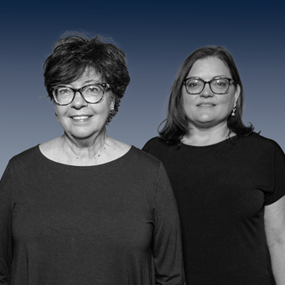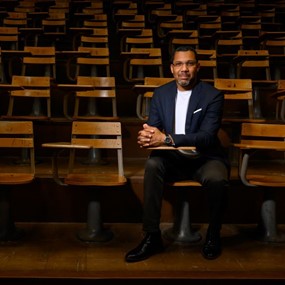Customized care: Auburn University body image research sets new standard for person-centered treatment
From research to treatment, students and faculty at Auburn University are leading the charge to dispel stereotypes about eating disorders. Their work lays a foundation for a new clinical model, one that understands that eating disorders can happen to anyone, and through that understanding, prepares clinicians to better help everyone.
Assistant Professor of Psychological Sciences Tiffany Brown leads the Appearance Concerns, Eating, Prevention and Treatment (ACCEPT) Lab and co-directs the Auburn Eating Disorders Clinic (AEDC). Through both, she leads a cyclical effort to investigate, test and improve eating disorders treatment.
"The really exciting thing for me as both a clinician and then also a researcher, an academic, is being able to integrate what we're finding out in research about risk for eating disorder behaviors within diverse groups," Brown said. "We can then actually apply that or target some of those factors in treatment."
Culturally informed research
The ACCEPT Lab researches the factors behind negative body image and eating disorders across traditionally underserved populations. Recent psychology graduate and research assistant Minh Le's '24 work focused on how identity-related stress affects body dissatisfaction, including in populations across racial groups and the LGBTQ+ community.
Le said Brown helped him translate his hope for positive change into deliverable results that will benefit future researchers and clinicians. For example, Le's study revealed that stress around hiding sexual identity can predict body dissatisfaction in Asian individuals.
"My initial process of wanting to do this project was me being a part of a minority group and also the LGBTQ+ community. I really saw a difference between individuals that I have met in my life, and I wanted to see if there was an impact on body dissatisfaction," Le said. "I saw in my experiences that there is a sense of shame and dishonor whenever you are seen outside of the 'normal' group within Asian cultures. So, I see why it makes sense that sexual orientation concealment would be the highest predictor for it."
Graduate research assistant and clinical psychology student Marley Billman Miller also studies body dissatisfaction with an intersectional lens. Her latest work studied how race, gender and sexuality interacts with body image and eating disorders.
She found that while BIPOC (Black, Indigenous or other people of color) men have low rates of body dissatisfaction, they reported higher rates of eating disorder behavior. Those behaviors included purging and excessive exercise, which may be considered atypical if research is only limited to body dissatisfaction as the driving force behind eating disorders.
Billman Miller said these findings are important because while stereotypes around eating disorders are changing, treatment is slower to develop.
"My hope for the future is that more representation is seen in clinical trials and better adaptations are made to the existing, evidence-based treatments," Billman Miller said. "What we know is even our best treatments are only meeting the needs of about 50% of our patients, so if we incorporate more representation within our clinical trials or adapt our existing evidence-based treatments for those groups, we'll see better outcomes for everybody."
Evidence backed treatment
Research from the ACCEPT Lab applies directly to developing informed treatments for AEDC patients. The AEDC, co-directed by Brown and Associate Professor April Smith, treats a variety of eating disorders across the lifespan.
Billman Miller, who came to Auburn after serving as a clinical research coordinator at the Penn State College of Medicine, said that direct link between research and treatment drew her to Auburn's doctoral program.
"Knowing that we had an in-house training clinic, where I could work directly with individuals who were struggling with eating disorders, was a huge draw, as well as the ample opportunities to get involved with both research and clinical work," Billman Miller said. "Auburn does a great job of balancing the two, so I knew I'd come out a very well-rounded researcher and clinician at the end of my training."
Graduate students both conduct research and serve as clinicians in the AEDC. They also help undergraduate researchers address the gap between body image literature and treatment.
Brown said undergraduate and graduate students bring a variety of perspectives to challenging the one-size-fits-all approach to eating disorder treatment.
"One of the things we're trying to do with both the ACCEPT Lab and then also the AEDC is to help provide affirmative care for LGBTQ folks. Specifically, our research is currently focused on developing more specific treatments that target unique risk factors for LGBTQ individuals with an eating disorder," Brown said. "For men, both in the ACCEPT Lab and at the AEDC, we're really trying to develop and deliver prevention and treatment programs that focus on both traditional and male-specific body image and eating disorder concerns."
Lifesaving results
Research and treatment for eating disorders, which are the deadliest among mental health conditions, is underfunded compared to other psychological disorders. While Auburn faculty and students treat as many people as possible, their efforts also contribute to preventative measures.
Through the research collected in the ACCEPT Lab and the AEDC, Auburn has developed and delivered programs to prevent body dissatisfaction and eating disorders before they start. One of those interventions focused on improving body image concerns for young men.
Le served as an interventionist during the program and said his work around body image has completely changed the trajectory of his psychology career.
"Initially I didn't really know where I wanted to go or what I had to do for it, but joining this lab has set so many foundations for me to know what my path is, what my goal is at the end," Le said. "I really hope to see a bigger understanding of how to accommodate each person's need, depending on their backgrounds, depending on their identities, that we do focus on what is the most important part of helping these individuals rather than just finding out what's wrong."
The demand for high-quality, research-informed eating disorders treatment in Alabama is high. The AEDC is uniquely positioned to deliver specialized care, but currently has a waitlist to manage its patient load. Further, it follows a sliding scale model for treatment cost, meaning patients can receive treatment at a more affordable rate than other clinics.
Brown said the self-funded clinic hopes to expand services to care for even more patients in the future.
"We had a waitlist basically within a week of opening, which both shows a huge need in the community here for eating disorder treatment, but also shows that we weren't able to fully care for everybody who was coming in and needing treatment," Brown said. "One of the really great things with having increased support from the university and donors is we've been able to expand our services further."
Since the AEDC opened in 2022, support from the Auburn Family has helped the clinic double its patient capacity by hiring two full-time graduate clinicians and assisting its low-income patients by covering treatment costs.
To give or learn more about how your support makes a difference, visit the AEDC website.
Tags: Students Faculty Research Community, Outreach and Engagement Psychological Sciences







